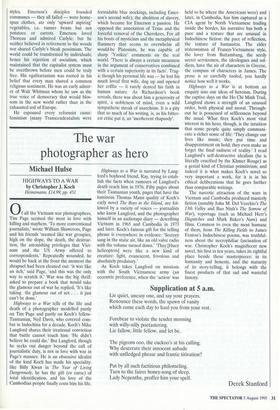The war photographer as hero
Michael Hulse
HIGHWAYS TO A WAR by Christopher J. Koch Heinemann, £14.99, pp. 451 0 f all the Vietnam war photographers, Tim Page seemed the most in love with killing and mayhem. 'To more conventional journalists,' wrote William Shawcross, Page and his friends 'seemed like war groupies, high on the dope, the death, the destruc- tion, the astonishing privileges that Viet- nam and the US Army offered to correspondents.' Repeatedly wounded, he would be back at the front the moment the shrapnel had been cleaned out: 'it was like an itch,' said Page, 'and this was the only way to scratch it.' War was the big thrill: asked to prepare a book that would take the glamour out of war he replied, 'It's like taking the glamour out of sex. . . it just can't be done.'
Highways to a War tells of the life and death of a photographer modelled partly on Tim Page and partly on Koch's fellow- Tasmanian, Neil Davis, who covered com- bat in Indochina for a decade. Koch's Mike Langford shares their irrational conviction that battle cannot touch him: 'He didn't believe he could die.' But Langford, though he seeks out danger beyond the call of journalistic duty, is not in love with war in Page's manner. He is an obsessive idealist of the kind Koch has made his speciality: like Billy Kwan in The Year of Living Dangerously, he has the gift (or curse) of total identification, and his love of the Cambodian people finally costs him his life. Highways to a War is narrated by Lang- ford's boyhood friend, Ray, trying to estab- lish the facts when rumours of Langford's death reach him in 1976. Fifty pages about their Tasmanian youth, pages that have the luminous Thomas Mann quality of Koch's early novel The Boys in the Island, are fol- lowed by a variety of voices — journalists who knew Langford, and the photographer himself in an audiotape diary — describing Vietnam in 1965 and Cambodia in 1973 and later. Koch's famous gift for the telling phrase is everywhere in evidence. 'Secrecy sang in the static air, like an old valve radio with the volume turned down.' They [Huey helicopters] were like a new kind of creature: light, evanescent, frivolous and absolutely predatory.'
As Koch takes Langford on missions with the South Vietnamese army (an eccentric preference, when the 'action' was held to be where the Americans were) and later, in Cambodia, has him captured as a CIA agent by North Vietnamese trading inside the border, his narrative has both a pace and a texture that are unusual in Indochinese fiction: the pace of reflection, the texture of humanitas. The elder stateswoman of Franco-Vietnamese style, the lover from Battambang, the seedy secret servicemen, the ideologues and sol- diers, have the air of characters in Greene, the compass of characters in James. The prose is so carefully tooled, you hardly notice how well it works.
Highways to a War is at bottom an enquiry into our ideas of heroism. During the captive days on the Ho Chi Minh Trail, Langford shows a strength of an unusual order, both physical and moral. Through- out he is possessed of selflessness beyond the usual. What fires Koch's most vital interest in his hero, though, is the intuition that some people quite simply communi- cate a richer sense of life: 'They change our lives like music; they put time and disappointment on hold; they even make us forget the final sadness of reality.' I read Langford's self-destructive idealism (he is literally crucified by the Khmer Rouge) as a genial kind of Christian primitivism; and indeed it is what makes Koch's novel so very important a work, for it is in his ethical deliberations that he goes further than comparable writings.
The narcotic attraction of the wars in Vietnam and Cambodia produced masterly fiction (notably John M. Del Vecchio's The 13th Valley and Bao Ninh's The Sorrow of War), reportage (such as Michael Herr's Dispatches and Mark Baker's Nam) and films. Common to even the most humane of them, from The Killing Fields to James Fenton's Indochinese poems, was truthful- ness about the necrophiliac fascination of war. Christopher Koch's magnificent new novel, his first in ten years, takes its rightful place beside these masterpieces: in its humanity and honesty, and the maturity of its story-telling, it belongs with the finest products of that sad and wasteful history.


















































 Previous page
Previous page